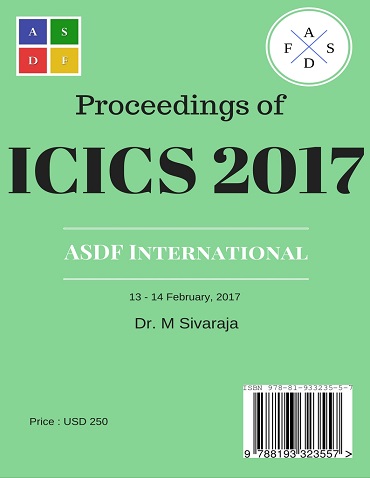- Publication Meta:Value
- Short Title:ICICS 2017
- Publisher:ASDF, India
- ISBN 13:978-81-933235-5-7
- ISBN 10:81-933235-5-6
- Language:English
- Type:Hard Bound - Printed Book
- Copyrights:ICICS Organizers / DCRC, London, UK
- Editor-in-Chief:Dr M Sivaraja
- Conference Dates:13 - 14, February 2017
- Venue Country:Karur, India
- Submitted Papers:456
- Acceptance Rate:8.08%
- Website:www.icics.asia
Welcome to ASDF Electronic Digital Library!
ICICS 2017
ICICS 2017
International Conference on Intelligent Computing and Systems 2017
Paper 006
Role of SCTP in Achieving Fair Bandwidth Allocation, Bottleneck Queuing in High Bandwidth - Delay Product Networks
Liston Deva Glindis1, Nelson Kennedy Babu C2
1,2Dhanalakshmi Srinivasan College of Engineering, India
Abstract
The rapid advancement in the deployment of very high bandwidth links in the Internet, which need a viable replacement of TCP in such environments, has become increasingly important in achieving efficient and fair bandwidth allocation while minimizing packet loss and bottleneck queue in high bandwidth - delay product networks A simple, low-complexity protocol, called Variable-structure congestion Control Protocol (VCP) [1] that leverages only the existing two ECN bits for network congestion feedback, and yet achieves comparable performance to XCP and to gain insight into the behavior of VCP, a simplified fluid model is designed to prove its global stability for the case of a single bottleneck shared by synchronous flows with identical round-trip times. On the downside, VCP converges significantly slower to a fair allocation than XCP. This paper is with a protocol called Stream Control Transmission Protocol (SCTP) with one bit ECN Nonce for Network congestion feedback and achieves comparable performance to XCP. The Stream Control Transmission Protocol is a Transport Layer protocol, serving in a similar role as the popular protocols Transmission Control Protocol (TCP) and User Datagram Protocol (UDP). It provides some of the same service features of both, ensuring reliable, in-sequence transport of messages with congestion control and minimizes packet loss and bottleneck queuing. i.e., high utilization, negligible packet loss rate, low persistent queue length, and reasonable fairness. The proposed model has been validated against and found to agree well with simulation results.
Keywords
Author's Profile
Author profile can be generated and linked through our partners World Book of Researchers. To include your profile online Click Here. After it is approved, please email to edlib @ asdf.res.in to create a link with all the papers.
e-AID
ICICS.2017.006
Cite this Article as Follows
Liston Deva Glindis, Nelson Kennedy Babu C. "Role of SCTP in Achieving Fair Bandwidth Allocation, Bottleneck Queuing in High Bandwidth - Delay Product Networks." International Conference on Intelligent Computing and Systems (2017): 03. Print.
© 2010 - by EDLIB .
All Rights Reserved.

